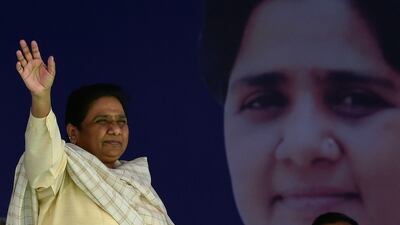The issue of caste is ever-present in India, in the foreground of any discussion about the country's politics and culture. For centuries it has stratified Indian society, preventing millions from achieving their potential. BR Ambedkar, a titan of the Dalit community who drafted India's constitution in 1949, put it well: "Caste is not a physical object like a wall of bricks or a line of barbed wire," he said. "Caste is a notion; it is a state of mind." Close behind it is the issue of gender in a country that has struggled to stem the number of attacks on women. On Friday, these two fault lines combined, when Sadhana Singh, a member of the ruling BJP, launched a bitter verbal attack against a political rival, Mayawati, who she called a "blot on womankind" and "worse than a transgender". Mayawati heads the Bahujan Samaj Party and is a leading political voice among India's lower caste communities. Her rise from humble origins to a potential prime minister makes her a shining light. But she is not exempt from the abuse and hostility that has come to characterise Indian politics since the BJP took power in 2014.
Ms Singh subsequently apologised after a BSP leader lodged a police complaint. But the row speaks to a rot at the core of Indian society, sustained by a narrative that women and Dalits need to behave in a certain way. Recent Indian history is replete with misogyny and casteism, committed with impunity by the powerful. In 2012, the gang rape of a 23-year-old female student on a Delhi bus, and her subsequent death, shocked the world but failed to change entrenched behaviour towards women. The Indian #MeToo movement outed dozens of public figures last year, while Neha Dixit has written poignantly on these pages of the ways in which Dalits are exploited in drug trials. And these are just two examples among thousands. Together they reveal a society that consistently fails to protect its vulnerable.
On gender equality and protections for women and low-caste communities, lessons clearly have not been learnt. Many Dalits now feel marginalised by the BJP, a party whose power is derived from majority rule. Indeed, as support for BJP Prime Minister Narendra Modi has dwindled, the party has resorted to exclusionary Hindu nationalism to win votes. The commanding Mayawati – the latest victim of this joint discrimination – will emerge unfazed. But this episode serves as a reminder of the immense progress that still needs to be made.

